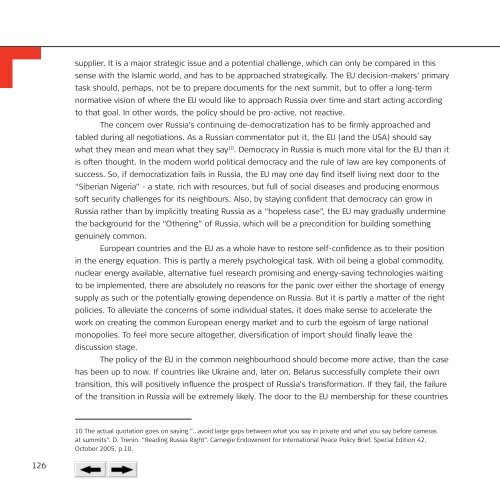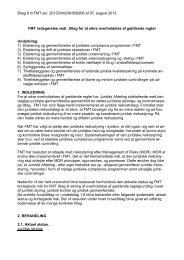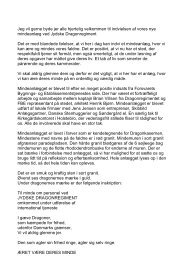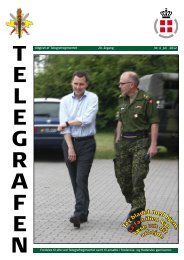Download PDF udgave
Download PDF udgave
Download PDF udgave
You also want an ePaper? Increase the reach of your titles
YUMPU automatically turns print PDFs into web optimized ePapers that Google loves.
126<br />
supplier. It is a major strategic issue and a potential challenge, which can only be compared in this<br />
sense with the Islamic world, and has to be approached strategically. The EU decision-makers’ primary<br />
task should, perhaps, not be to prepare documents for the next summit, but to offer a long-term<br />
normative vision of where the EU would like to approach Russia over time and start acting according<br />
to that goal. In other words, the policy should be pro-active, not reactive.<br />
The concern over Russia’s continuing de-democratization has to be fi rmly approached and<br />
tabled during all negotiations. As a Russian commentator put it, the EU (and the USA) should say<br />
what they mean and mean what they say10 . Democracy in Russia is much more vital for the EU than it<br />
is often thought. In the modern world political democracy and the rule of law are key components of<br />
success. So, if democratization fails in Russia, the EU may one day fi nd itself living next door to the<br />
“Siberian Nigeria” - a state, rich with resources, but full of social diseases and producing enormous<br />
soft security challenges for its neighbours. Also, by staying confi dent that democracy can grow in<br />
Russia rather than by implicitly treating Russia as a “hopeless case”, the EU may gradually undermine<br />
the background for the “Othering” of Russia, which will be a precondition for building something<br />
genuinely common.<br />
European countries and the EU as a whole have to restore self-confi dence as to their position<br />
in the energy equation. This is partly a merely psychological task. With oil being a global commodity,<br />
nuclear energy available, alternative fuel research promising and energy-saving technologies waiting<br />
to be implemented, there are absolutely no reasons for the panic over either the shortage of energy<br />
supply as such or the potentially growing dependence on Russia. But it is partly a matter of the right<br />
policies. To alleviate the concerns of some individual states, it does make sense to accelerate the<br />
work on creating the common European energy market and to curb the egoism of large national<br />
monopolies. To feel more secure altogether, diversifi cation of import should fi nally leave the<br />
discussion stage.<br />
The policy of the EU in the common neighbourhood should become more active, than the case<br />
has been up to now. If countries like Ukraine and, later on, Belarus successfully complete their own<br />
transition, this will positively infl uence the prospect of Russia’s transformation. If they fail, the failure<br />
of the transition in Russia will be extremely likely. The door to the EU membership for these countries<br />
10 The actual quotation goes on saying ”…avoid large gaps between what you say in private and what you say before cameras<br />
at summits”. D. Trenin. “Reading Russia Right”. Carnegie Endowment for International Peace Policy Brief. Special Edition 42,<br />
October 2005, p.10.

















